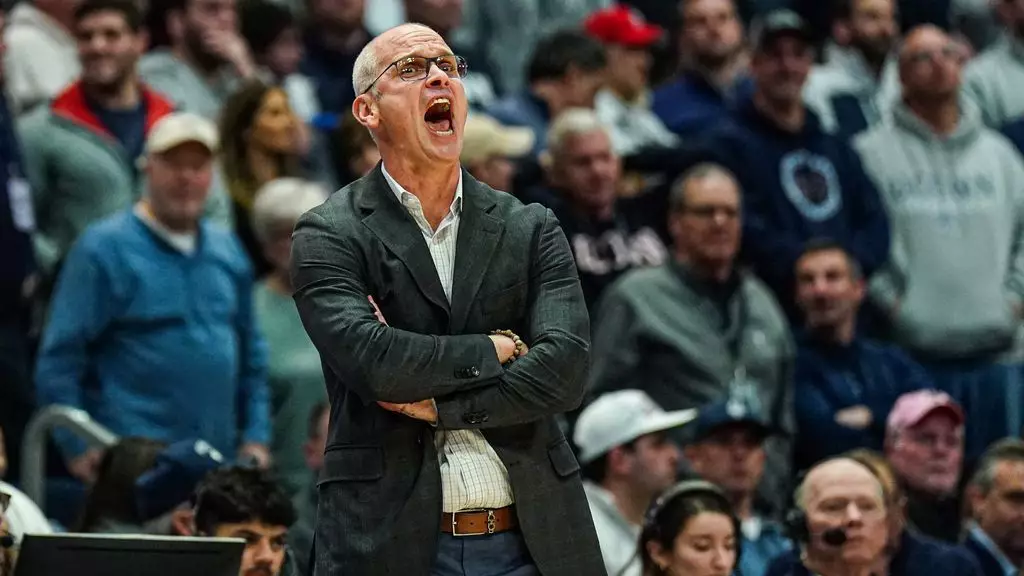In the heated arena of college basketball, emotions run high, and conflicts often spill into the public eye. UConn coach Dan Hurley found himself at the center of such controversy after his team’s narrow loss to Florida in the NCAA tournament. His remarks to players from Baylor about officiating not only overshadowed the commendable run his team had enjoyed over the previous three years but also sparked a debate about the thin line coaches tread between professional decorum and passionate reactions. While many sports commentators often romanticize the zeal that coaches deliver, the reality is that there are consequences to emotional outbursts, especially when those emotions are expressed poorly in front of media and cameras.
The Fallout from Unbridled Emotion
As Hurley later addressed reporters, revealing a layer of self-awareness, he voiced regrets for the incident. His acknowledgment of the inappropriateness of his comments brings to light an important aspect of coaching: the responsibility that comes with leadership. Coaches are more than strategic minds; they are role models who set the tone for conduct both on and off the court. There is a differentiation to be considered—a passion for winning should never morph into vindictiveness toward referees or other teams. Hurley’s choice to express frustration not only reflects poorly on him but also has broader implications for his program and its reputation.
Moreover, the UConn coach’s comments could have potentially initiated a dialogue on officiating standards and accountability in college sports. Instead, the focus shifted to his outburst, exemplifying a frequent problem in sports media where sensational personal narratives often overshadow critical discussions on systemic issues within the game. For someone who has been involved in collegiate athletics for quite some time, it seems paradoxical that Hurley may not have anticipated the consequences of such raw expressions.
Media Dynamics: A Double-Edged Sword
In the age of social media, where every moment can be captured and dissected, Hurley’s emotional comments were destined to make headlines—not entirely unlike the players he coaches. The ensuing issues following the video capture— including UConn’s communications director Bobby Mullen engaging in a problematic approach to a journalist—added yet another layer of complexity to this unfolding drama. It is emblematic of how the pursuit of protecting one’s team can sometimes lead to resorting to tactics that threaten transparency and free speech.
We must assess how coaches, like Hurley, can better navigate this high-pressure environment. The media plays a crucial role in sports, yet coaches must adapt their strategies to utilize it constructively rather than obstructively. After all, if programs like UConn wish to foster an atmosphere of respect and professionalism, their representatives must embody those ideals consistently—even in the heat of competition.
Self-Reflection and Future Lessons
Hurley’s reflection, as vulnerable as it is, invites broader considerations about emotional management. It highlights that even the most seasoned leaders can allow frustrations to manifest in uncharacteristic ways. Coaches across all sports should embrace moments of introspection, evaluating how reactions can be more measured without sacrificing the intensity that fuels their leadership.
For Hurley, this regret, coupled with promises to do better, should also be a reminder that passion can be expressed without damaging words. The fiery spirit he embodies doesn’t need to be extinguished but rather channeled constructively into motivating his team and advocating for them without crossing over into detrimental behavior.
While Hurley’s emotional outbursts have ignited debates about coach-player relations and officiating standards, they serve as a stark reminder of the complexities inherent in sports leadership. As he grapples with this chapter of his career, it remains to be seen whether this moment will emerge as a pivotal learning experience—not just for him but for coaches everywhere who navigate the relentless pressures of the game.


Leave a Reply